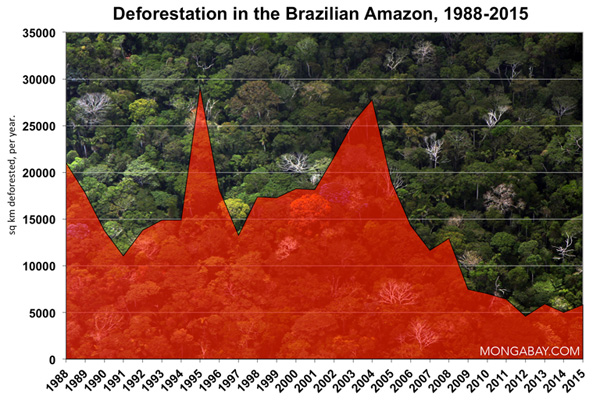
Annual deforestation in the Brazilian Amazon. Click image to enlarge
Roughly half of the 70 percent decline in deforestation in the Brazilian Amazon between 2005 and 2009 can be attributed to policies enacted by the Brazilian government, asserts an analysis published by the Climate Policy Initiative (CPI), a group funded by George Soros. The measures helped avoid 62,000 square kilometers of deforestation and 620 million tons of carbon dioxide emissions that would have otherwise occurred.
The study used regression analysis to isolate the effects of agricultural prices and other macroeconomic factors from policies enacted to slow deforestation, including improved monitoring and enforcement, expanded protected areas, and financial incentives for compliance with environmental laws. These policies were put into motion following a sharp spike in deforestation in 2003 and 2004. In 2008, the federal government strengthened environmental protection by establishing blacklists for municipalities with high deforestation rates. Blacklisted municipalities lost access to low interest credit and faced heightened monitoring. The only path towards getting off the blacklist was establishing a land registry to demonstrate compliance with forest laws and reducing deforestation.
CPI aims to next determine what specific policies were most effective in reducing deforestation, according to co-author Juliano Assunção, director of CPI’s Rio de Janeiro branch and professor at the Department of Economics at the Pontifical Catholic University of Rio de Janeiro (PUC-Rio).
The study could have implications for efforts to reduce deforestation elsewhere. Other tropical countries already look toward Brazil as a model for cutting forest loss without sacrificing economic growth. For example, Indonesia recently adopted a national growth plan that includes reductions in deforestation and forest degradation.
But the effectiveness of government policy in reducing deforestation in Brazil has recently sparked a backlash among some agricultural producers in the country, which are now trying to weaken some environmental laws, including the Forest Code, which restricts the amount of forest a landowner is allowed the clear. Last year ruralistas — a coalition of agribusiness interests — attempted to push through a substantially weakened version of the code, although the Senate version of the bill retained some of the original safeguards against forest clearing. Brazilian President Dilma Rousseff is expected to vote on the measure in coming weeks.
Deforestation Slowdown in the Legal Amazon: Prices or Policies? [PDF]
Related articles







